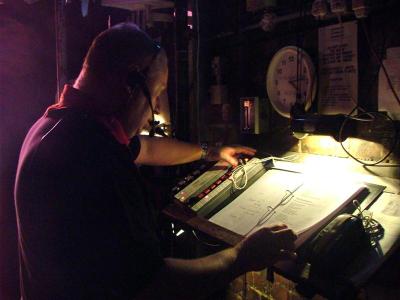
(in a nut shell)
Introduction
The Job
Pre-Production
Rehearsals
Techinical Rehearsals
The Run
Post-Production
Supplies
Tips
Vocabulary
 The Job:
The Job:The stage manager's jobs vary depending on the director, the company that show is being produced by, and even the show itself. The title gives a good idea of what job involves at the core. The stage manager keeps track of everything that happens on stage, and off stage in regard to the production. Before rehearsals and during rehearsals, the stage manager is really an assistant to the director (different from an assistant director) and keeps track of what happens during rehearsals, what the designers are thinking, what the director wants, and making sure which ever information needs to get someplace, gets there. When technical rehearsals start is when the stage manager becomes the focus. The stage manager is the one who calls the show, makes sure everything and everyone is ready for the performances, and is overall the one in-charge.
The parts of the production can be split up into several catagories:
Before Rehearsals: The time before the rehearsals starts. This is when auditions happen, many design and concept meeting happens, and the stage manager gets to know the team working on the show.
Rehearsal process: During rehearsals tends to be very dull, with a lot of sitting and writing, but stage managers need to pay attention. Rehearsals are filled with recording the directions of the director.
Technical Rehearsal: Technical rehearsals are very busy, as everything is coming together and the stage manager is in charge. During this time the work of the designers and the work of the director is all put together with the stage manager making sure everything happens. How well this fits together is very strongly related to how well the stage manager relayed information between departments.
The Run: During the run everything tends to settle into routine as all the kinks of the show should be worked out in tech.
Post-show: After the show, everything is cleaned up and finished with.
Dance shows and musicals also tend to follow this format. In my experience, dance shows tend to be easier, as the dancers and choreographers tend to record their own dances. There are usually less complicated techincal aspects to deal with during a dance show as well. Musicals are the opposite. The stage manager has to keep track of blocking, dancing and singing. During tech the music has to be incorporated (usually a live band), making the rehearsals more complicated.